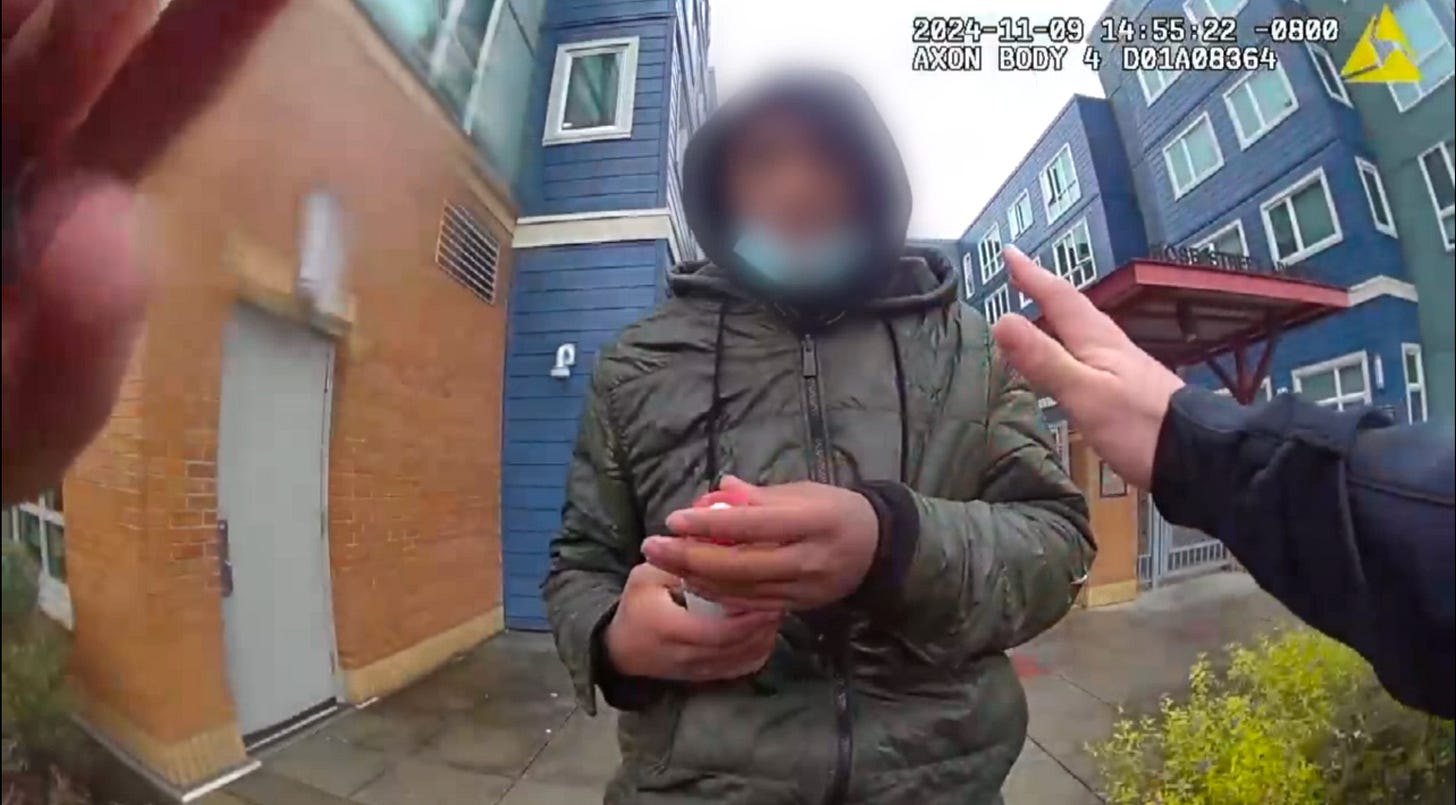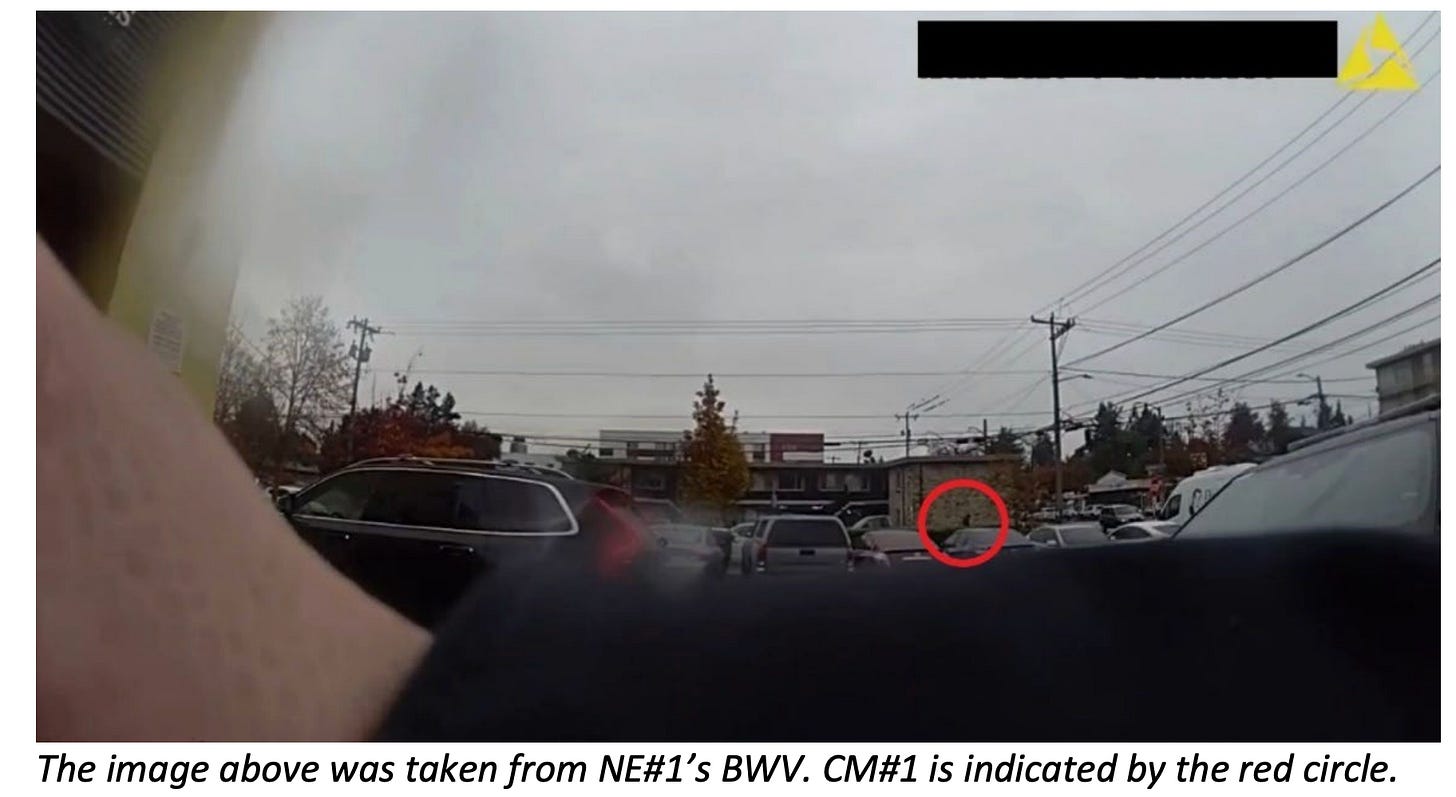Seattle problem cop suspended for illegal stop-and-frisk of Black youth
An officer who consistently leads the department for OPA investigations was suspended for unlawfully searching a young Black man on his way home.
Buy a copy of this officer’s baseball card here and help fund our statewide police misconduct database.
A South Seattle officer with an extensive disciplinary history was again suspended over an illegal search last November, according to a report released on Friday. The Office of Police Accountability found that Officer Stephen Englund, who averages seven OPA investigations annually, exceeded the lawful scope of a detention and lacked a valid safety reason to frisk a Black youth he detained.
On Nov. 9, 2024, Englund detained, handcuffed, and searched the youth while investigating a stolen truck recovered a few blocks away. The OPA found that Englund’s initial decision to detain the young man was justified based on Englund’s claim that he ran away when he made eye contact with Englund. However, Englund’s bodycam footage contradicts this.
When Englund first contacts the youth outside his apartment building, he is nonchalantly picking open a bottle of strawberry milk. He doesn’t appear to be fleeing and walks back toward Englund after hearing him shouting.
Furthermore, the OPA called many of Englund’s observations “questionable.” For example, Englund claimed he saw the young man’s eyes widen suspiciously upon seeing officers, and he changed direction.
The OPA points out that the youth was “barely visible” on video and much farther away than the 20 to 30 feet Englund estimated in his report — so far that it was virtually impossible for Englund to make out his “alarmed expression” from that distance.
The youth’s clothing also did not match the surveillance footage, which showed the suspected car thief wearing black pants and a matching hooded sweatshirt, with a white undershirt poking out from underneath. The man Englund stopped wore a green hoodie and tan pants.
Though he was wearing a white undershirt, his jacket extended well below it, so it was not visible, and Englund was not apparently aware of it until he searched the man later. He claims to have noticed it during their initial interaction before he cuffed and searched the man, but OPA found this to be suspect.
Nevertheless, the OPA found Englund’s detention justified despite all the inconsistencies in his account. Citing a Supreme Court case involving a man fleeing from a narcotics-trafficking area, the OPA found that Englund’s Terry stop was lawful based on a partial physical match with the suspect and his supposed flight.
Unlawful search
After asking only a couple of questions, Englund handcuffed the youth and began searching him. The SPD Terry stop policy requires officers to have a “reasonable articulable” justification for further limiting a person’s freedom during a stop.
This includes any actions that would indicate to an average person that they will soon be placed under arrest, such as handcuffing them, taking them away from the location of the stop, frisking them, or putting them in the back of a cruiser. Englund did all of these things.
Englund claimed that he handcuffed the young man and took him to the front of his cruiser for safety reasons, but the youth did not pose a threat. OPA described him as “calm and cooperative,” showing no signs that he was armed or preparing to flee. Englund also alluded to Rainier Beach’s reputation as a high-crime area, but the neighborhood has lower-than-average crime, and crime levels are comparable to Madrona, an affluent area to the north.
Once they got to the cruiser, Englund conducted what he called a “frisk,” but the captain who referred the complaint to OPA characterized it as a “custodial search.” Englund went beyond a typical patdown for weapons, pulling up the man’s clothing, grabbing at his pockets, and feeling around on an object in his jacket.
While Englund said he was looking for weapons, he did not pat down the arms, back, and legs, which is usually done during a frisk. A frisk is a cursory search for weapons by patting down the outside of a person’s clothing, but Englund was clearly looking for evidence, including the keys to the stolen truck and matching articles of clothing — like the white undershirt that he later claimed to have already seen at that point.
After the search, Englund said: “So, before I continue, I’m seeing a lot of clothing now that’s starting to match a little bit more of what I saw, so I’m going to advise you of your Miranda rights.”
OPA argued this statement showed that the “search was intended to uncover evidence of the original crime, and not to address any reasonable, articulable safety concern.”
Englund continued questioning him about the stolen truck, saying that the youth was on video exiting it. He promised that he would try to cite and release him if he cooperated and gave up the keys. The young man denied having the keys or stealing the vehicle.
Following a few minutes of questioning, Englund placed him in the back of the cruiser— i.e., further restricted his freedom — while he checked him for warrants. Finding nothing, Englund released him and made a last-ditch effort to get him to confess, warning that he would dust the truck for fingerprints.
The OPA sustained allegations that Englund exceeded the scope of the Terry stop and lacked an articulable safety concern to justify a frisk. He was suspended for two days.
It’s curious that the OPA did not add dishonesty allegations. The video demonstrated that Englund made several false claims about the basis for the stop and the nature of his search. Though it was never alleged, there’s also a clear pattern of racial bias in Englund’s frisks, according to city Terry stop data.
Black people, who make up 7 percent of Seattle’s population, accounted for half of Englund’s frisks. These frisks were far less likely to take place in the context of incidents that ended in arrest. He frisked white people 30 times and arrested 30. By contrast, Englund frisked Black people 32 times but only arrested 17.
This means that his stops of white people were more likely grounded in a genuine “reasonable suspicion” that the person committed a crime, whereas his stops of Black people were more likely the product of racial profiling or a baseless hunch.
Englund completed his training at the end of 2020 and has consistently been among the top 10 recipients of complaints every year. Last year, only three officers had more OPA investigations.
In 2024, he disobeyed orders and chased a stolen car through a park in Des Moines, then bumped it off a bridge with a juvenile passenger still inside. Most recently, he forcefully shoved a fleeing suspect down, causing him to strike his head on a shopping cart.



